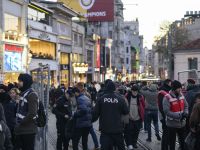Syrian forces and their Russian allies should give the United Nations control over the new humanitarian corridors they established in Aleppo, UN Syria envoy Staffan de Mistura said Friday.
"Our suggestion is to Russia to actually leave the corridors being established at their initiative to us," de Mistura told reporters in Geneva.
"The UN and their humanitarian partners know what to do," the UN diplomat added. "That's our job."
The Syrian government said Thursday it had opened three humanitarian corridors in Aleppo to help civilians leave the rebel-held neighbourhoods in the city's east.
Russian Defence Minister Sergei Shoigu said Moscow would assist with the operation, which also provides assistance to militants who surrender their weapons.
After blocking all incoming supply routes, regime forces under Syrian President Bashar al-Assad are attempting a siege of Aleppo's rebel-held areas, where an estimated 250,000 to 300,000 civilians are thought to remain.
De Mistura demanded that no civilians be forced to leave, and that those who chose to exit Aleppo should have the right to go where they wish.
In addition, there should be a sustained ceasefire so that leaving civilians as well as entering humanitarian convoys are not put at risk, he said.
"There need to be guarantees on the protection of civilians," de Mistura said.
He stressed that the Russian and Syrian proposal was still a draft, and that Moscow had shown willingness to heed outside advice on its humanitarian plan.
Supplies in the besieged part of Aleppo will last only for three more weeks, according to the UN.
Earlier this month, al-Assad's forces blocked Castello Road, the only major supply route into rebel-held eastern Aleppo, raising fears about a humanitarian disaster there.
Regime forces on Friday attacked the opposition-controlled section of the northern city, activists in the area said.
Head of Aleppo's local council Brita Hagi Hassam accused al-Assad's regime and Russia of propagating "lies" about humanitarian assistance.
"Not only have they cut off the sole lifeline to eastern Aleppo, but they have killed children and women," Hassam wrote in a Facebook message. "They have also bombed hospitals and vital places in order to force people into submission."
The Syrian Observatory for Human Rights, a monitoring group, said that only 12 people had left Aleppo's beleaguered areas through one humanitarian passageway before rebel groups set up checkpoints and prevented people from approaching the exit corridors.
The Observatory's head Rami Abdel-Rahman told dpa that regime aircraft and artillery struck rebel-held districts overnight. He did not give casualty figures.
Entrances to the humanitarian corridors from the opposition-held areas were on Friday effectively shut, according to Abdel-Rahman.
Activists inside rebel-held districts said inhabitants are hesitant about leaving because they are afraid to be arrested by regime forces after crossing the humanitarian routes.
Once Syria's commercial hub, Aleppo has been divided between government forces in the west and rebels in the east since fighting erupted for control of the city in mid-2012.
Elsewhere in northern Syria, Islamic State executed at least 24 civilians after the extremist militia seized a village in the city of Minbij near the Turkish border from the US-backed Kurdish Democratic Forces of Syria (DFS), the Observatory said.
The reported executions were carried out in the village of al-Buyir located some 10 kilometres north west of Minbij, a main passageway between the Turkish border and Islamic State's de facto capital of al-Raqqa in north-eastern Syria.
In May, the Kurdish-led DFS forces started an onslaught to retake Minbij from the al-Qaeda splinter group.
Islamic State is notorious for execution-style killings in Syria and neighbouring Iraq where it has established a foothold.
By Albert Otti and Weedah Hamzah








